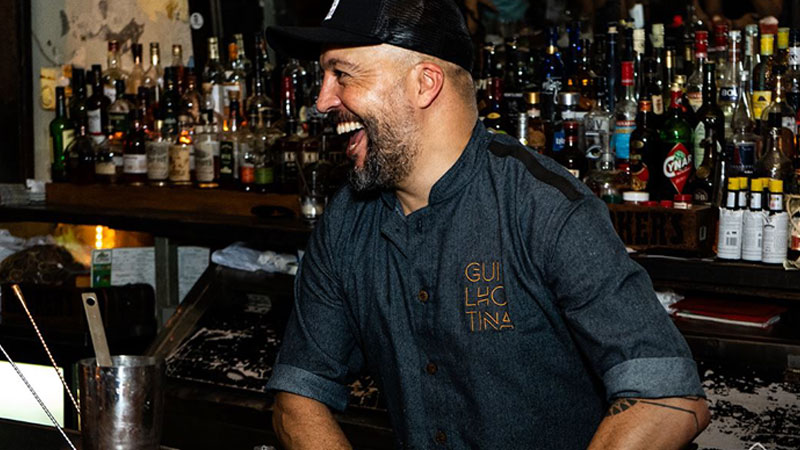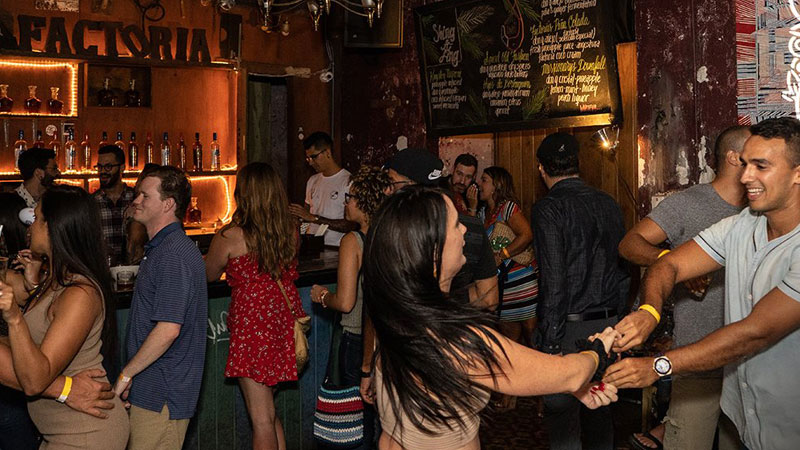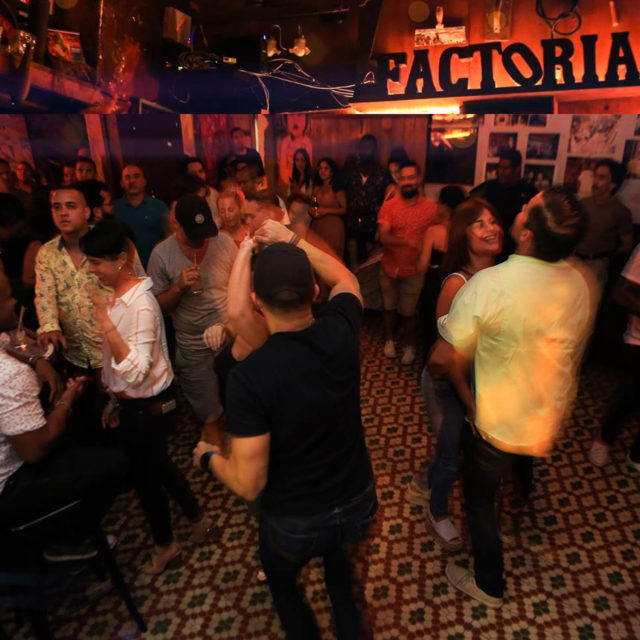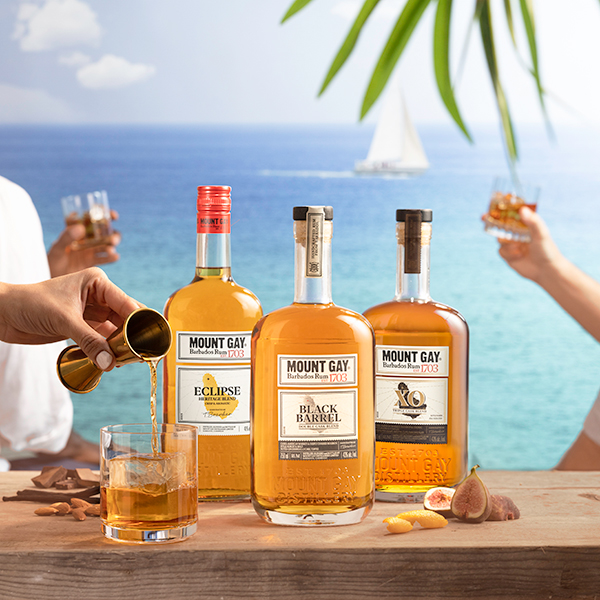Seated on a van traveling from San Juan, Puerto Rico, to Ponce, on the south coast, is a bartender from Paris by way of Venezuela, another from Barcelona, one from Beirut, and another from Cyprus. Filling it out are the young bartenders and prep masters of La Factoría’s burgeoning bar empire. (And then there’s me, in the back corner, on my laptop.)
The Old San Juan bar La Factoría opened in 2013 and has been named to the World’s 50 Best list since 2015. Last weekend, it celebrated its sixth anniversary with a two-night bash honoring its drink community from near and far. We capped it off with a field trip to Ponce’s Destileria Serrallés, maker of Puerto Rico’s beloved Don Q rum.
“In Puerto Rico, if you have a place open for three years, it’s like, ‘Whoa, you made it!’” says Roberto Berdecia, a co-owner. Last year, when La Factoría hit five, it was cause for massive party. Thus began the tradition of a two-night event the third weekend of April; one evening features local bartenders serving short menus of their signature cocktails, and the second highlights international folks. The weekend also celebrates a custom work by a Puerto Rican artist. This year, that was Elizabeth Barreto, who created a tattoo-like design of a woman sipping a cocktail amid tropical fauna featured on posters, T-shirts, and the custom menus printed for the festivities.
While bars have always had a prime place in Puerto Rican culture — serving up beers, shots, and, of course, Piña Coladas — craft cocktails began to emerge in the early ‘10s through the restaurant Santaella, where Leslie Cofresí worked. He and Berdecia represented the island for the World Class competition in 2012 and 2011, respectively. When they opened La Factoría, it was at a time when more bartenders around the world were opening bars themselves, the cocktail renaissance of the 2000s having birthed a whole new generation.

During a pre-party meet-and-greet on April 19, the visiting bartenders from abroad talked about their own journeys. Each was invited because of their innovative approach and high-volume experience.
Dinos Constantinides of Lost and Found in Cyprus spoke of struggles to get ingredients taken for granted in bigger countries, the financial crisis, lack of money — relatable issues for everyone at La Factoría and in Puerto Rico broadly, which has been suffering its own economic issues and crushing oversight from the continental United States.
Moe Aljaff of Two Schmucks in Barcelona also had no investors, just him and his co-owner, opening what they call a “five-star dive bar.” In Beirut, Jad Ballout, who serves cocktails with Middle Eastern-inspired ingredients at Central Station, has struggled against the perceptions of Lebanon from abroad to prove that Beirut is a city like any other with underground clubs and parties. Cristina Hernandez of Candelaria in Paris serves Latin American spirits in an elegant space tucked behind a taco counter in the Marais, while Renato Giovanni of Florería Atlántico in Buenos Aires started from the ground up six-and-a-half years ago. In that time, his staff has grown from five to 38.
Each comes from a place similar to what Cofresi and Berdecia have created at La Factoría: scrappy but intentional, a party but deliberate, where the cocktails are exceptional but if you order a beer and a shot, no one will look at you sideways.
All these bartenders from abroad prepped with the bar chefs from La Factoría’s Licoreria Miramar, a kitchen space that creates juices, infusions, and garnishes for bars and restaurants throughout San Juan, before their guest shifts on April 20. Dehydrated citrus, cucumber syrup, and chamomile soda are scattered about the narrow space. Ballout goes over his recipes with Gabriel de Jesus, who runs the kitchen. Sous vide will be used for consistency of spices in his “Caribbean Baklava”; the orange blossom for the “Middle Eastern Highball” should go into a bottle with a dropper.
The Friday night party featured bartenders from local spots such as Santaella, La Penúltima, Jungle Bird, and Timber and Blues from Aguadilla on the west coast. All took over different bars in the La Factoría labyrinth, which includes six separate bars, each with its own vibe, music, and menu. It was important to Cofresi and Berdecia to include others in the industry on the island, in recognition of how much stronger the scene can be if it’s standing on the shoulders of many bars with their own characteristics.
On Saturday, the international group took over. With Aljaff in La Cubanita, an old-school bar that La Factoría took over two years ago, laybacks and shotgunning cans of local beer Medalla were the order of the evening. Hernandez served her menu to a salsa soundtrack. Her “Guapo” stood out, the delicate spice of a chipotle and red pepper syrup against the smoke of Sombra Mezcal. Constantinides, to dance music, served the night’s most elaborate drinks — including the rum- and aperol-based “Three of Strong” in a Chinese takeout container, all a daring undertaking in such a high-volume space. In the main bar, Giovanni was putting out gorgeously considered cocktails, including the “El Clericot de Retiro,” Patrón Silver Tequila, vermouth bianco, cucumber syrup, and a garnish of eucalyptus that elevated the bianco’s floral notes.

This kind of exchange has been key to growing Puerto Rico’s cocktail community, which has expanded exponentially since La Factoría first opened. The island recently hosted Tales of the Cocktail “on tour” and will soon execute its first cocktail week —something that had been in the works before Hurricane Maria arrived and threw plans off course. In the last year, much has been restored, seeing La Factoría get a semifinalist nomination from the James Beard Foundation for best bar program and become a finalist for high-volume cocktail bar at Tales of the Cocktail’s Spirited Awards, proving the bar and the island itself could return not just to normalcy but excellence.
Massive annual events don’t always foster the deepest connections, though. “We’re a super-small market, so once a year the only excuse we have to really do something to celebrate La Factoría and to join the global bar community is to bring some bars over,” says Cofresí. “Now that La Factoría is set up and hopefully will be there forever, we’re thinking about how to create traditions.”
The bar has become an “emblematic place,” he notes, which isn’t an achievement it’s taking lightly. From showing off Puerto Rico’s bartenders to bringing in varied sensibilities from around the world, their anniversary could become its own emblem of cultural exchange, with healthy doses of debauchery and rum.

